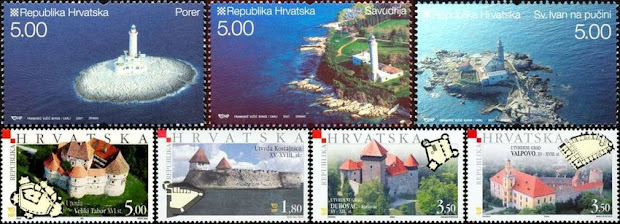Miroslav Krleža is a towering figure of 20th century Croatian literature. His tremendous activity and great contribution to Croatian culture don't allow for a summary in a post like this, so I gladly refer to the Wikipedia entry for more information. Surprisingly, that entry makes no mention of the fact that Miroslav Krleža (1893-1981) was the editor in chief of the Enciklopedija Jugoslavije. Precisely about his work on the encyclopedia some until know unknown documents have been discovered.
 The 536 pages with Krleža's notes give an interesting insight in the daily course of events in the editorial offices, according to Jutarnji list. He not only had to accommodate the ruling socialist ideology - he and Tito got along quite well, by the way - but also to satisfy the editorial team of each and every of the six republics that made up Yugoslavia.
The 536 pages with Krleža's notes give an interesting insight in the daily course of events in the editorial offices, according to Jutarnji list. He not only had to accommodate the ruling socialist ideology - he and Tito got along quite well, by the way - but also to satisfy the editorial team of each and every of the six republics that made up Yugoslavia.
And that's pretty much all Jutarnji had to say, as the promised insights are nowhere to be found on its website. I was interested in knowing how Krleža kept a balance between the interests of Yugoslavia's many nations and nationalities and the unitary political and economic doctrines. So I turned to the institution that published Krleža's notes, the noteworthy Matica hrvatska, the mother of all Croatian cultural institions. The latest issue of Kolo, one of Matica's periodicals, is devoted to Krleža's outpouring, but on their website the winter issue 2007 still figures prominently. Croats did not yet fully embrace the internet, to put it mildly.
I went to the National and Scientific Library, in potential a fantastic place but in reality rather disappointing. Their latest Kolo issue was from spring 2008. I give up on Kolo, for now.
If you are a real fan of Krleža then it's good to know that the Lexigographic Institute Miroslav Krleža, formerly know as the Yugoslav Lexicographical Institute led by Krleža, has published a three volume encyclopedia about him. It treats in great detail everything that is remotely connected to Krleža.
 The 536 pages with Krleža's notes give an interesting insight in the daily course of events in the editorial offices, according to Jutarnji list. He not only had to accommodate the ruling socialist ideology - he and Tito got along quite well, by the way - but also to satisfy the editorial team of each and every of the six republics that made up Yugoslavia.
The 536 pages with Krleža's notes give an interesting insight in the daily course of events in the editorial offices, according to Jutarnji list. He not only had to accommodate the ruling socialist ideology - he and Tito got along quite well, by the way - but also to satisfy the editorial team of each and every of the six republics that made up Yugoslavia.And that's pretty much all Jutarnji had to say, as the promised insights are nowhere to be found on its website. I was interested in knowing how Krleža kept a balance between the interests of Yugoslavia's many nations and nationalities and the unitary political and economic doctrines. So I turned to the institution that published Krleža's notes, the noteworthy Matica hrvatska, the mother of all Croatian cultural institions. The latest issue of Kolo, one of Matica's periodicals, is devoted to Krleža's outpouring, but on their website the winter issue 2007 still figures prominently. Croats did not yet fully embrace the internet, to put it mildly.
I went to the National and Scientific Library, in potential a fantastic place but in reality rather disappointing. Their latest Kolo issue was from spring 2008. I give up on Kolo, for now.
If you are a real fan of Krleža then it's good to know that the Lexigographic Institute Miroslav Krleža, formerly know as the Yugoslav Lexicographical Institute led by Krleža, has published a three volume encyclopedia about him. It treats in great detail everything that is remotely connected to Krleža.





0 reacties:
Post a Comment